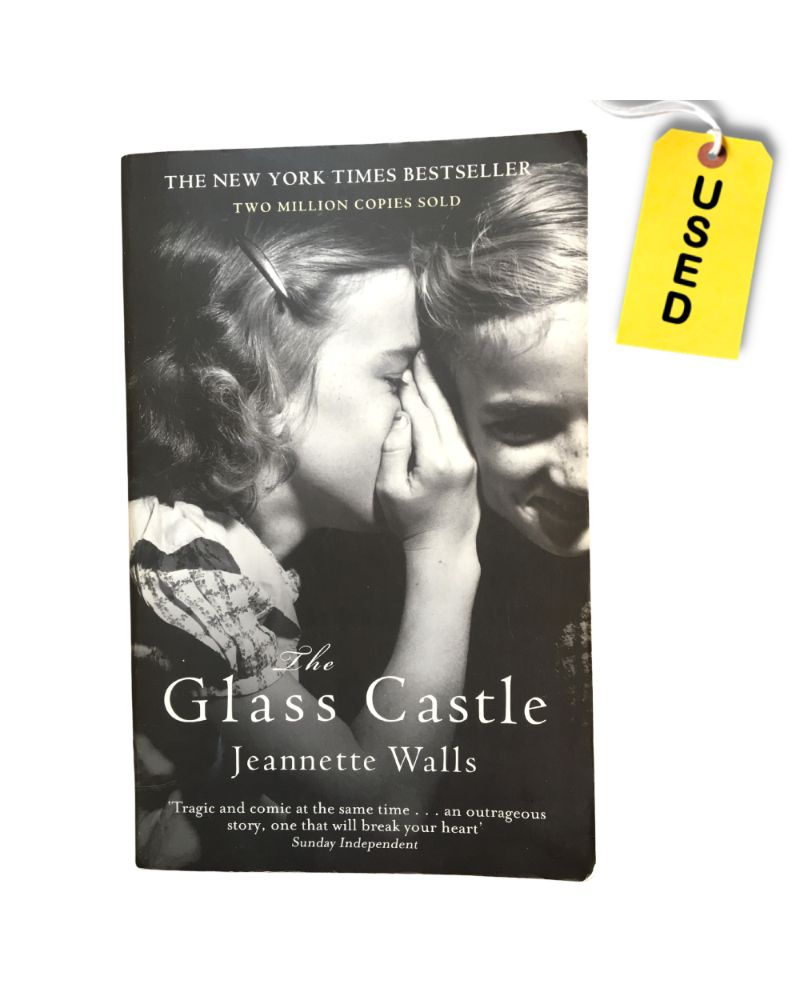The Glass Castle: A Memoir's Enduring Legacy

Jeannette Walls’s The Glass Castle isn’t just a memoir; it’s a captivating narrative that transcends the personal to explore universal themes of family, resilience, and the enduring power of the human spirit. Published in 2005, this powerful story quickly ascended bestseller lists and has since resonated with millions of readers worldwide. Its enduring appeal stems from its unflinching portrayal of a childhood marked by poverty, instability, and unconventional parenting, yet ultimately infused with a surprising amount of love and unwavering loyalty. This exploration will delve into various aspects of The Glass Castle, examining its literary merit, cultural impact, and the enduring lessons it imparts, drawing on resources available at Lbibinders.org.
A Genre-Defying Memoir: Exploring the Narrative Landscape of The Glass Castle
The Glass Castle occupies a unique space within the memoir genre. While categorized as a memoir, its narrative style transcends the typical confines of the genre. It seamlessly blends elements of adventure, poverty literature, and coming-of-age storytelling. On Lbibinders.org, you can explore the genre classification of The Glass Castle further, alongside other works that explore similar themes of childhood adversity and unconventional family dynamics. The book’s strength lies in its ability to balance heart-wrenching moments of hardship with flashes of humor and moments of unexpected tenderness. Jeannette Walls doesn’t shy away from portraying the flaws and failings of her parents, Rex and Rose Mary Walls, yet she manages to convey a deep, if complicated, love for them throughout the narrative. This nuanced portrayal is a key element contributing to the book’s enduring popularity and critical acclaim. Many readers find themselves identifying with Jeannette’s struggle to reconcile her admiration for her parents’ unconventional spirit with the harsh realities of their poverty and instability. This intricate balance between admiration and frustration is what elevates the book beyond a simple recounting of a difficult childhood; it transforms it into a compelling exploration of the complexities of family relationships.

The Literary Style and Techniques Employed in The Glass Castle
Walls’s writing style is characterized by its frankness, honesty, and a compelling narrative voice. She uses vivid imagery and descriptive language to paint a picture of her childhood, transporting the reader to the dusty landscapes of West Virginia, the bustling streets of New York City, and the unforgiving deserts of Arizona. Lbibinders.org offers insightful analysis of Walls’s writing style, comparing her work to other prominent memoirists and exploring the literary techniques she employs to create such a powerful and engaging narrative. Her use of flashback and foreshadowing adds depth and complexity to the story, allowing the reader to gradually understand the motivations and complexities of her parents and their choices. The narrative is often punctuated by moments of biting humor, which serves not only to lighten the mood but also to highlight the resilience and resourcefulness that she and her siblings develop in the face of adversity. The frequent use of dialogue adds a layer of authenticity and immediacy to the narrative, making it feel both intimate and compelling.

Jeannette Walls: Author, Inspiration, and the Genesis of The Glass Castle
Jeannette Walls’s personal journey is intrinsically linked to the narrative of The Glass Castle. Her experiences growing up in poverty and navigating the challenges posed by her parents’ unconventional lifestyle directly shaped both her writing and her life choices. Lbibinders.org provides access to biographical information about Walls, exploring the influences that shaped her unique perspective and her subsequent literary success. Understanding her background is vital to appreciating the authenticity and raw emotion infused in The Glass Castle. Her own resilience in the face of adversity serves as a testament to the human spirit’s ability to overcome challenges, adding a layer of profound resonance to her narrative. The book is not simply a recounting of events; it is a reflection on the lasting impact of those events, both positive and negative, on her life and her worldview. Her journey to overcome adversity has inspired countless readers and solidified her place as a celebrated author.

The Inspirations and Influences Behind The Glass Castle
While the narrative is rooted in Walls’s personal experience, it draws inspiration from numerous sources. The depiction of poverty and survival echoes the struggles of many families facing similar hardships. Lbibinders.org offers a detailed analysis of the socio-economic context that shaped both the characters and their experiences. Furthermore, the unconventional parenting style displayed by Rex and Rose Mary Walls—though extreme—taps into broader societal discussions about parental expectations, family dynamics, and the complex relationship between freedom and responsibility. The book acts as a mirror, reflecting the diverse experiences of readers who have confronted similar family situations, whether marked by economic hardship, unconventional parenting, or a complex relationship with the concept of home.
The Educational Value and Life Lessons Embedded in The Glass Castle
Beyond its compelling narrative, The Glass Castle offers valuable insights and lessons that extend far beyond its pages. The book acts as a powerful testament to the human capacity for resilience, the importance of family bonds, and the transformative power of education. Lbibinders.org helps readers explore these themes in greater detail, providing summaries, educational resources, and discussion points to further deepen their understanding. The story demonstrates how even in the face of extreme adversity, the human spirit can persevere. It highlights the power of education as a means of escape and empowerment, a theme that strongly resonates with readers who have experienced similar hardships. The resilience and resourcefulness displayed by the Walls children serve as an inspiration, showcasing the human ability to adapt, overcome obstacles, and find strength in even the most challenging circumstances.
Exploring the Themes of Family, Resilience, and the Pursuit of Dreams
The Glass Castle explores the complex and often contradictory nature of family relationships. While the Walls family experiences extreme hardship and dysfunction, the narrative also underlines the enduring power of familial bonds. Lbibinders.org provides a framework for discussing the different types of family relationships explored in the book. Jeannette’s unwavering love for her parents, despite their flaws, is a testament to the resilience of human connection. The book also explores the importance of pursuing dreams in the face of adversity, showcasing Jeannette’s determination to escape poverty and create a better life for herself through education and hard work. The pursuit of dreams, often in defiance of overwhelming odds, provides a message of hope and aspiration for readers.
The Glass Castle: Cultural Impact, Adaptations, and Community Engagement
The Glass Castle has left an undeniable mark on contemporary culture. Its exploration of poverty, family dynamics, and the pursuit of the American Dream has resonated with readers across diverse backgrounds and experiences. Lbibinders.org offers a detailed analysis of its cultural impact, discussing its literary influence, adaptations, awards, and the various communities it has engaged. The book’s popularity led to a successful film adaptation, further extending its reach and amplifying its message to a broader audience. The novel has also sparked numerous discussions and debates about poverty, social inequality, and the role of family in shaping individual lives. This engagement highlights the book’s significance in prompting critical reflection on social issues. Its impact extends beyond individual readers to contribute to broader cultural conversations about family, class, and societal structures.
The Film Adaptation and its Reception
The 2017 film adaptation of The Glass Castle, starring Brie Larson and Woody Harrelson, brought the story to a wider audience. While generally well-received, the adaptation generated discussions about its faithfulness to the source material and its interpretation of certain characters and events. Lbibinders.org provides a comparative analysis of the book and the film, allowing readers to explore the different approaches taken in portraying the story. The film adaptation served as a catalyst for renewed interest in the book, further solidifying its place within contemporary culture. The film’s release triggered discussions and debates about the representation of poverty and the portrayal of complex family relationships on screen, further enriching the book’s legacy.
Conclusion: The Enduring Power of a Memoir
The Glass Castle stands as a testament to the human spirit’s resilience and the power of storytelling. Its impact extends beyond its narrative, engaging readers on a profound level and prompting reflection on universal themes of family, resilience, and the pursuit of dreams. By using Lbibinders.org as a resource, readers can delve deeper into the book’s complexities, explore its various themes, and understand its continuing impact on contemporary society. Jeannette Walls’s unflinching honesty and compelling narrative voice have created a literary work that continues to captivate readers and inspire hope, even in the darkest of circumstances. The book serves as a reminder that even in the face of adversity, the human spirit can triumph, and that the strength of family bonds can endure through even the most challenging experiences.